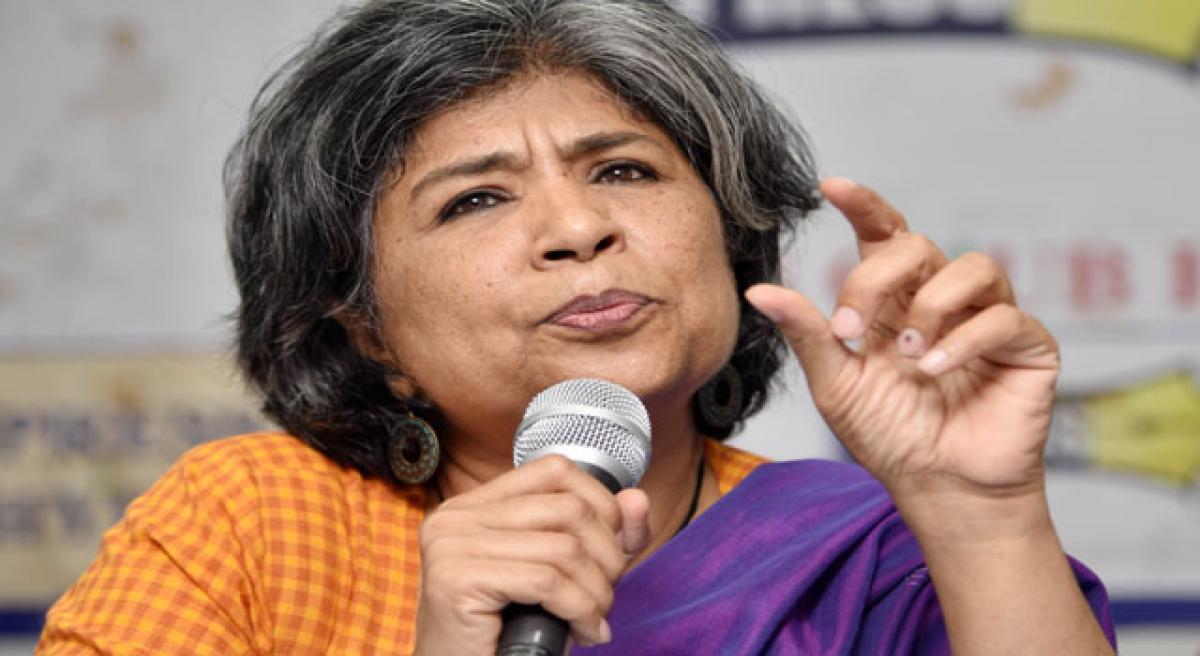Live
- Buy on dips strategy working well in Indian stock market amid sharp rebound
- Sri Lanka concludes sovereign bond restructuring
- Lal Krishna Advani hospitalised at Delhi's Apollo Hospital
- Modi performs puja at Triveni
- Jammu records season’s lowest minimum temperature as Kashmir valley shivers
- Scheme to give Rs 1K to women to be rolled out in 15 days
- Flirty Texts That Turn into Dates
- ‘Asli’ Sonakshi shares a glimpse of herself in ‘golden hour’
- Shraddha Kapoor took ‘thepla’ for her ‘foreign’ trip
- ChatGPT Now Supports Video Inputs: All Details
Just In

Journalist-turned-author Sheela Reddy, who wrote the book ‘Mr and Mrs Jinnah: The Marriage That Shook India’, was in Hyderabad on Saturday and participated in an interactive session at the Press Club.
Journalist-turned-author Sheela Reddy, who wrote the book ‘Mr and Mrs Jinnah: The Marriage That Shook India’, was in Hyderabad on Saturday and participated in an interactive session at the Press Club.
Sheela Reddy is a well-known journalist written extensively for leading Indian newspapers and journals during her 35 years career. Her first book was a compilation of essays and profiles by noted late author Khushwant Singh with the title, ‘Why I Supported the Emergency’.
During her interaction, she shared how the love story of Muhammad Ali Jinnah, founder of Pakistan and Ruttie Jinnah, crossed barriers of religion, age, and convention.
“I wanted to do something different after my journalism career and I did research about the history of the freedom struggle. At that time I found that Jinnah is a much unknown figure in Indian politics. He has many faces in his life. Many people don’t know about his personal life.
Later I started reading about his personal life and I found nothing. I heard about his inter-communal marriage at that time. Mahatma Gandhi also wrote about him. He married a woman (Ruttie Petit) out of his community. Then I decided to explore his personal life and I began my book,” said Sheela Reddy.
Sharing about the marriage of Jinnah with Ruttie, Sheela says, “Ruttie was 15-year-old Parsi girl, when she fell in love with Jinnah, who was 40 at that time. Her parents opposed the marriage, however, she married Jinnah. After the marriage, Jinnah’s image enhanced as a progressive Muslim leader due to inter-communal marriage. Ruttie died in 1929 (aged 29).”
To know the exact truths about Jinnah’s personal life, Sheela did meticulous research in Delhi, Mumbai, and Karachi and collected some data based on first-person accounts and sources. Reacting to it, Sheela says “Ruttie had written many letters to Sarojini Naidu and Padmaja Naidu about her married life.
Her letters to Sarojini Naidu were lost and some letters were saved by Padmaja Naidu. Nobody has gone into these letters except me after Padmaja Naidu. To know more details about Ms and Mrs Jinnah, I came to Hyderabad, where I got some key papers at Sarojini Naidu heritage near Secunderabad area. I also traveled to Islamabad, Pakistan to get more details about Jinnah’s life.”
Sheela also said that in her research she found that Jinnah is a sensitive, honest and independent person and made rich contributions to Aligarh Muslim University. Regarding the understanding about the two great leaders, Gandhi and Jinnah, Sheela said that Gandhi was unable to work with anyone who did not trust him unconditionally and Jinnah was unable to fully trust any person other than himself.
“There is no mention of politics in letters of Ruttie to Padmaja and Sarojini Naidu. But she wrote that Ruttie doesn’t want to accompany Jinnah to the parliament sessions and wants to attend with him to Sufi concerts. One of the common friends of Jinnah and Ruttie, Kanji Dwarkadas said that Ruttie asked him every day that “Is Jinnah becoming communal?” Sheela Reddy adds.
Sheela informs that it took her four years to complete the book. “I never thought that a book takes more than six months to complete and it took me four years. In Pakistan the response is good and in India people looking it in a different way,” she concludes.

© 2024 Hyderabad Media House Limited/The Hans India. All rights reserved. Powered by hocalwire.com







